Before we get to the main point of the article, you’ll have to forgive two digressions related to my search for the subject of this article. Firstly, the search for minority newspaper turned up a large number of African American newspapers. Indeed, Google suggested alternatives that specifically ruled out other groups more than a couple of times. I could only speculate as to the meanings and implications of this. It surprised me certainly. Secondly, the process by which I came about the newspaper. Because I am somewhat contrary, I wanted to do a non-African American newspaper simply because it was because the opposite of where I was being directed by the Googlebeast. And because I was compelled by its very origins, that of a newspaper seeking to reach, represent a group not so widely covered, implied they should not be the regular but the relatively ignored. But mostly because I was contrary.
So, I sought to escape the world of the Googlebeast and its algorithms, and asked around among friends and acquaintances. And the answer came not from their answers but by accident. A friend mentioned the Cherokee Phoenix had not, in fact, shut down when the militia came and confiscated their printing press but was still in operation. Whether it has been in continuous operation I cannot say, but it has been in operation since at least 2003, and is financially backed, at least for the moment, by a tribal council. It was, until recently, available for all Cherokee Indians who could prove citizenship in the Nation. It was also mostly in English, which is good, because I can’t read Cherokee. This, I thought, was it. My odyssey was over, I had landed in Ithaca (or Latium if you prefer the Aeneid), but that itself was not the end.
Runner up goes to Today’s Zaman who lost on the technicality it is a Turkish paper, and thus not within American Journalism. Still, a Turkish paper that caters to English speakers with an article, albeit an opinion piece, on minority press within Turkey was a temptation.
Perhaps it is because the first bit of the Cherokee Phoenix I’d ever seen was basically mundane, specifically a man informing the community that he was no longer backing his wife’s credit, but the relatively mundane nature of the newspaper didn’t surprise me. It took on the aspects more of a community newspaper than that of an advocate newspaper, reporting on the community rather than hurling invective or persuasive articles to try and change a wider opinion. That is not to say it was similar to other newspapers, it catered to a very specific community and dealt with their issues. Those issues, now as then perhaps, were largely mundane. There was internal election news, external elections were relatively less covered. More so than either were internal event news, things about tribal politics, campaigns, building projects, employment relief, and so on. The only external election I saw extensively covered was, understandably enough, Elizabeth Warren, due to the controversy. Retreading the entire argument with all its pitfalls isn’t for this blog, but suffice it to say there were some false claims while she still in academia that Warren was a minority via being a Cherokee Indian. She is not, by the Cherokee’s own account.
She was, however, still dwarfed by community issues. In particular, proposals about voting rights seem to have kicked up a good deal of interest. Perhaps the greatest flaw in choosing this newspaper is that it caters to an enfranchised community with political control over a certain area, since that seems to tend it towards those patterns. But then again, that is what the newspaper was from the start. It was also what newspapers like The Republican or other abolitionist newspapers were. Of course, what they did to eventually contribute to the Civil War and end of slavery was more memorable, but the average days news was probably more mundane. Just as someone looking back at the Times in the lead up to the Iraq War will remember its articles that supported it, the eventual apology, and forget that there were also articles on a number of other topics that history will probably forget. For example, the Los Angeles Herald (with thanks to Laura) had an article reviewing a play. I say this not to criticize this type of article specifically, but to point out that if, in the future, the Herald becomes remembering as the primary force behind some widespread social change, who will remember that play article?
This is not to say that such newspapers are unimportant or do not play a role in social change, or that they will not play that role, to some degree, into the future. The limits of their audience does limit them, to some degree, though. The New York Times may, through its own ignorance, unknowingly represent an overly white view of the world. But knowingly representing a view of a minority world limits your readership, or at least I would imagine it does. Tracking down racial statistics for some of these newspapers is surprisingly difficult, but if nothing else the fact that among my friends, who are fairly diverse, few could mention minority newspapers, even if they were minorities themselves, would seem to prove my point. Thus it seems overly optimistic for them to provide some equal service to the majority newspapers, but they remain an important avenue for a community’s specific needs. Whether they will go on to become important policy makers, or no more relevant than Threads remains to be seen, and probably depends on the cohesion and maintenance of racial identity.







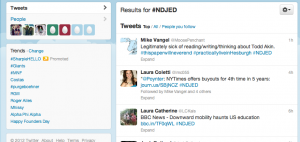
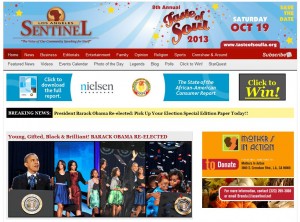
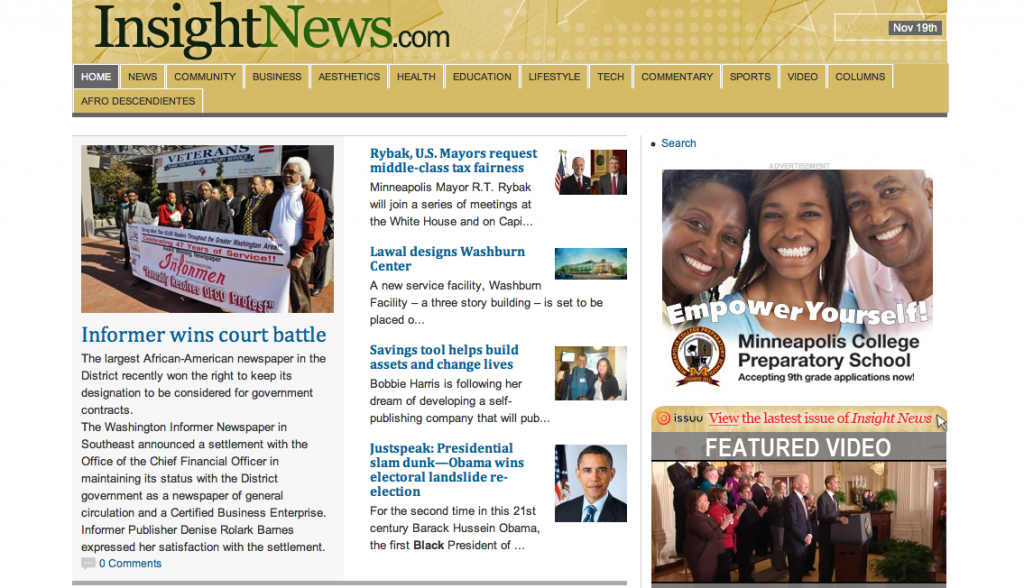
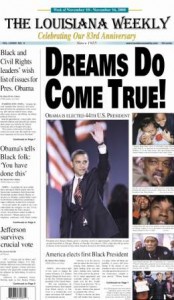
 On its homepage on 11/13/12, I found the following five stories – all related to the election – rotating in the top page element:
On its homepage on 11/13/12, I found the following five stories – all related to the election – rotating in the top page element: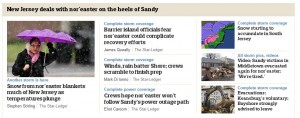
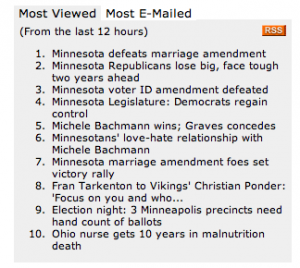
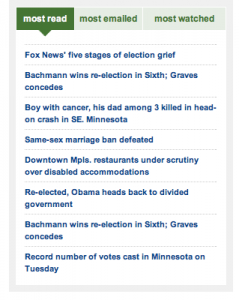





 need constant connection to the web. They need it to check facts, to log stories on their respective sites, and, of course, to disseminate their findings through social media. As a journalism student, understanding the process of journalism and having the ability to track it as it happens provides invaluable insight into how news is reported and why the story never seems to be complete. The iPad fosters this kind of learning through apps like Flipboard to keep on-the-go students always plugged in.
need constant connection to the web. They need it to check facts, to log stories on their respective sites, and, of course, to disseminate their findings through social media. As a journalism student, understanding the process of journalism and having the ability to track it as it happens provides invaluable insight into how news is reported and why the story never seems to be complete. The iPad fosters this kind of learning through apps like Flipboard to keep on-the-go students always plugged in.
